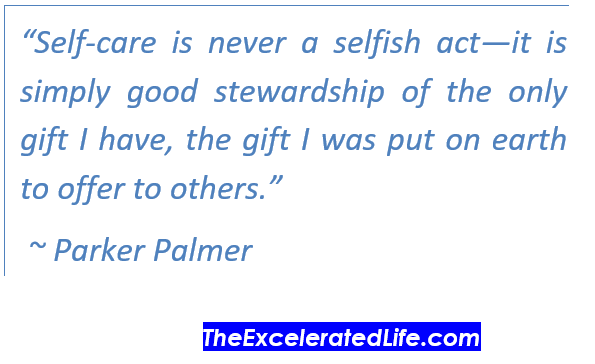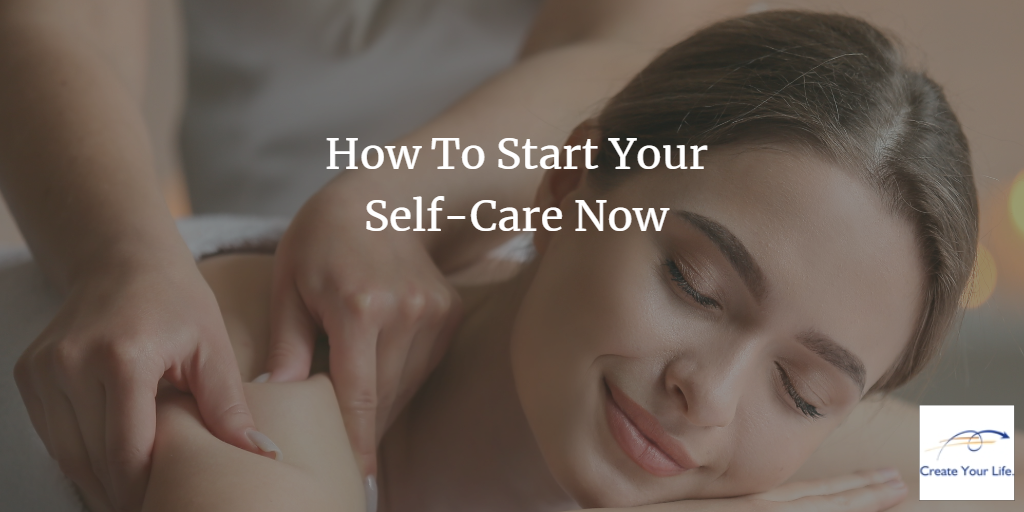Having a workable self-care routine is essential if you want to live an Excelerated Life™. Focusing on the fundamentals is a good place to start your self-care.
TheExceleratedLife.com
Photo by Authentic Stock on StockSnap

Why do you need to take care of yourself?
Self-care is necessary if you want to live an Excelerated Life™. So much so that it is one of the six Principles.
Think about it this way. Let’s say you wanted to donate money to a charity. What do you need? You need some money. Or suppose you want to give food to a food bank. What do you need? You need some food. And if you want to love and care for others, you must first love and care for yourself. You cannot give away that which you do not have. This is the basis for Excelerated Self-Care™.
What is self-care?
Self-care is all about the everyday habits that help you take care of and nurture your health and well-being. To be your best you must take care of your physical, mental, and emotional health.
And just as it is necessary to nurture your relationships well before you need them, you must start your self-care program while you are still healthy, not after you get sick. Eating a healthy diet, getting sufficient sleep, moving your body, handling stress, and taking time for yourself helps you maintain good health, resiliency, and leads to well-being. [Davis]
What self-care is not.
Starting a self-care practice entails caring for yourself in healthy ways. Self-care is not binging out in front of the TV with a 1/2 gallon of Rocky Road ice cream. It is not having that 3rd (or 4th or 8th) beer to “relax” after a stressful day. And self-care does not include locking yourself away in your room and refusing to deal with a stressful situation.
Self-care is not selfishness. It’s about being selffull — taking care of yourself so you can give your best in Service to the world.
Where do I start?
“A wise man . . . built his house on the rock. And the rain fell, and the floods came, and the winds blew and beat on that house, but it did not fall, because it had been founded on the rock. . . a foolish man . . . built his house on the sand. And the rain fell, and the floods came, and the winds blew and beat against that house, and it fell, and great was the fall of it.” ~ Matthew 7: 24-27 (ESV)
If you are planning to start a self-care program, start with the fundamentals. This way, you lay a solid foundation upon which to build.
Start small. At this stage, consistency is more important than trying to do a 180-degree turn-around. Small and easy are the keys to making a lasting improvement.
Don’t decide to go to bed at 8:00 PM if you are used to staying up till midnight. Aim to go to bed 15 minutes earlier. Add 15 minutes every 4 – 5 days till you reach your target bedtime to allow you at least 7 hours of sleep.
If you want to stop drinking soft drinks (a great idea, by the way), don’t try to quit cold turkey. If you drink a liter per day (and I have some friends who have done this), cut back a few ounces, say 2 and 1/2 cans of soda. This cuts your intake from 34 ounces to 30. Every couple of days, cut out a few more ounces until you can stop altogether.
This gives you an idea of how to begin. Start your self-care program by focusing on the fundamentals and taking tiny steps.
What are the fundamentals?
So, what are the fundamentals of self-care?
Eating. Moving. Sleeping.
We get these from Tom Rath’s excellent book, Eat Move Sleep: How Small Choices Lead to Big Changes. We could consider these as the three supporting columns for our health and well-being. However, research shows that one of these three is even more basic than the other two. Instead of being one of three columns, it is the foundation upon which the other two columns stand. That foundation is sleep, so we’ll start there.
Sleep
Sleep matters because it is a fundamental part of physical and mental health. Sleep gives our bodies an opportunity to repair and rejuvenate. Some studies have shown that functions such as muscle growth and tissue repair occur mainly during sleep.” [“Why Do We Sleep, Anyway?”]
Sleep appears to be necessary for a healthy brain as well. Brain plasticity – the ability of the brain to re-wire itself and strengthen connections — is linked to sleep. Lack of sleep negatively impacts our ability to learn and perform a variety of tasks. Sleep is integral to learning and to the ability of the brain to heal itself. [“Why Do We Sleep, Anyway?”]
Eat
Eating. The typical American diet isn’t working for most of us. In 2018, the last year for which statistics are available, 40% of adults over 20 – more than 93 million people – were obese, a medical condition where a person has excessive body fat. [Newman] There are a number of health problems related to obesity, including Type 2 diabetes, high blood pressure, heart disease, and stroke to name only a few. [Newman]
It is said that we exercise for fitness but we eat for weight control. In other words, you can’t control your weight if you don’t control what and how much you eat.
Move
Moving. A popular saying from a couple of years ago is that “sitting is the new smoking”. While the risks from smoking continue to far outweigh the risks of sitting, there is evidence that a sedentary lifestyle (sitting 8 or more hours per day) can have adverse health effects. It can double the risk of Type 2 diabetes while increasing the chances of some other chronic diseases by up to 20%. [Vallance]
The good news is that you don’t have to work out for an hour or more each day – unrealistic for many of us. NEAT – non-exercise activity thermogenesis is “the energy expended for everything we do that is not sleeping, eating or sports-like exercise.” [Levine] This includes most of our daily activities, such as standing, walking, doing yard work or housework, typing, cooking, even fidgeting. Keeping this in mind, you can easily see ways to increase your NEAT expenditure. Easy to see, not necessarily easy to do unless you make a specific effort to add to your activity.
How do I start my self-care practice?
Start by understanding the importance of self-care. It isn’t selfish. It’s being selffull — taking excellent care of yourself so you can give your best service to the world.
Make self-care a priority. An important area such as your own self-care must be a priority if you are going to pay attention to it and do the practices. It doesn’t have to be a huge chunk of time, a few minutes of deep breathing is sometimes all that’s needed. But you also should plan chunks of time for exercise, cooking healthy meals, or whatever your needs are.
Start tiny. Consider the story of how mini habits were developed by Stephen Guise as he relates in Mini Habits: Smaller Habits, Bigger Results. Stephen wanted to begin an exercise program but he just could not make himself start. He decided to begin by doing 1 push-up. He could do more if he wanted but he would be finished after one. This allowed him to get past the inertia and get started. Soon, using the concept of mini-habits, he was doing a 30-minute workout.
Finally, if you are just beginning a self-care practice, start with the fundamentals.
What if I don’t practice self-care?
There are plenty of excuses, er, um, I mean reasons for not taking care of yourself. Here are a few.
- Don’t have time.
- Don’t know how.
- Don’t make it a priority.
- Put other’s needs first.
However, the time you put into a basic self-care practice pays dividends in improved health and overall well-being. You won’t have to take as much time off because you’re sick or just don’t feel well and you’ll have more energy and stamina.
But you must understand that you cannot give your best to others if you don’t first care for yourself. Once you see the importance of starting a basic self-care routine, you’ll make it a priority.
And if you don’t know where to start . . . read on.
Where do I go from here?
There is no shortage of ideas and suggestions for improving your self-care to begin taking good care of yourself.
You can Google self-care to get self-care tips, self-care ideas, and self-care activities.
Or you can read more about sleeping here: Why Sleep Matters
About eating here: Eat Food
About all 3 here: Excelerated Fundamentals and here: 10 Ways To Take Good Care Of Yourself
But as a wise man once said, what we need isn’t more knowing, but a lot more doing. If you are hesitant about using the time to care for yourself, remember this. The reason we want to be at our best is so that we can give our best in service to the world. That is embracing your Excelerated Life™!
(Please NOTE: I am neither a medical professional nor a licensed counselor. If you suffer from any health issues or before you make major changes in your health maintenance, consult with a qualified medical professional.)
Excelerated Fundamentals™ — perfecting basic self-care practices — is one step in creating your Excelerated Life™, a life of flourishing and well-being, and a life of meaning, purpose, and service.
Read more about the Excelerated Life™.
Resources:
Davis, Ph.D., Tchiki. “Self-Care: 12 Ways to Take Better Care of Yourself.” Psychology Today. Sussex Publishers, LLC, December 28, 2018. Web. June 7, 2020.
Guise, Stephen. Mini Habits: Smaller Habits, Bigger Results. CreateSpace Publishing. 2013.
Newman, Katelyn. “Obesity in America: A Public Health Crisis.” U.S. News & World Report. U.S. News & World Report L.P., 19 September 2019. Web. 12 November 2019.
https://www.usnews.com/news/healthiest-communities/articles/2019-09-19/obesity-in-america-a-guide-to-the-public-health-crisis
Rath, Tom. Eat Move Sleep: How Small Choices Lead to Big Changes. Arlington, VA: Missionday, 2013.
Vallance, Jeff K. and others. “Evaluating the Evidence on Sitting, Smoking, and Health: Is Sitting Really the New Smoking?” PMC US National Library of Medicine. National Center for Biotechnology Information, U.S. National Library of Medicine. 1 July 2018. Web. 12 November 2019.
https://www.ncbi.nlm.nih.gov/pmc/articles/PMC6187798/
Walker, Phd, Matthew. Why We Sleep. New York: Scribner, an imprint of Simon & Schuster, Inc., 2017
“Why Do We Sleep, Anyway?” Healthy Sleep. The Division of Sleep Medicine at
Harvard Medical School, December 18, 2007. Web. January 23, 2021.
http://healthysleep.med.harvard.edu/healthy/matters/benefits-of-sleep/why-do-we-sleep


